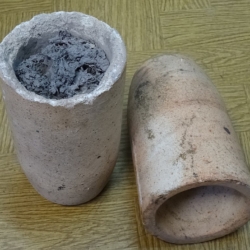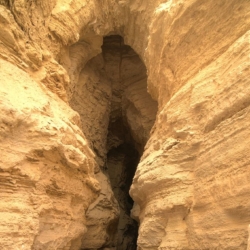Contributor(s): Shared on: Categories: Tags: | Source (Hebrew) | Translation (English) |
|---|
1 לַמְנַצֵּ֗חַ לְדָ֫וִ֥ד |
1 David sings |
אָ֘מַ֤ר נָבָ֣ל בְּ֭לִבּוֹ
אֵ֣ין אֱלֹהִ֑ים |
The bully says in his heart,
“There is no God.” |
הִֽשְׁחִ֗יתוּ הִֽתְעִ֥יבוּ עֲלִילָ֗ה
אֵ֣ין עֹֽשֵׂה־טֽוֹב׃
3 הַכֹּ֥ל סָר֮ יַחְדָּ֢ו נֶ֫אֱלָ֥חוּ
אֵ֤ין עֹֽשֵׂה־ט֑וֹב
אֵ֝֗ין גַּם־אֶחָֽד׃ |
The schemes of the mob are abominable;
not one of them does anything good.
3 They form a gang to terrorize people;
not a single one of them
does any good. |
4a הֲלֹ֥א יָדְעוּ֮ כׇּל־פֹּ֢עֲלֵ֫י־אָ֥וֶן
אֹכְלֵ֣י עַ֭מִּי
אָ֣כְלוּ לֶ֑חֶם
5a שָׁ֤ם ׀ פָּ֣חֲדוּ פָ֑חַד
6a עֲצַת־עָנִ֥י תָבִ֑ישׁוּ
4b יְ֝הֹוָ֗ה לֹ֣א קָרָֽאוּ׃ |
4a Don’t those sinners know?
They scarf up my people
as if they were their bread.
5a They have reason to panic.
6a They shame the poor for being poor;
4b not one of them calls on God. |
2 יְֽהֹוָ֗ה מִשָּׁמַיִם֮
הִשְׁקִ֢יף עַֽל־בְּנֵי־אָ֫דָ֥ם
לִ֭רְאוֹת הֲיֵ֣שׁ מַשְׂכִּ֑יל
דֹּ֝רֵ֗שׁ אֶת־אֱלֹהִֽים׃
5b כִּֽי־אֱ֝לֹהִ֗ים
בְּד֣וֹר צַדִּֽיק׃
6b כִּ֖י יְהֹוָ֣ה מַחְסֵֽהוּ׃ |
2 YaH looks down from the heavens,
scanning human beings,
looking to see if there is anyone aware,
seeking God.
5b God will protect
the generation of the righteous,
6b for YaH is their Protector. |
7 מִ֥י יִתֵּ֣ן מִצִּיּוֹן֮ יְשׁוּעַ֢ת יִשְׂרָ֫אֵ֥ל
בְּשׁ֣וּב יְ֭הֹוָה שְׁב֣וּת עַמּ֑וֹ
יָגֵ֥ל יַ֝עֲקֹ֗ב יִשְׂמַ֥ח יִשְׂרָאֵֽל׃ |
May it happen soon—
7 that God will send
the salvation of Israel from Ẓion. |
Rabbi Zalman Schachter-Shalomi’s translation and reworking of Psalms 14 was first published in Psalms in a Translation for Praying (Alliance for Jewish Renewal, Philadelphia: 2014), p. 17. Reb Zalman was, in 2009, an early advocate of the Open Siddur Project and generously shared his liturgical and prayer work with the project following his vision of a common “Database Davvenen.” I have set his translation opposite the Masoretic Hebrew text of the psalm according to the phrasing he provided. –Aharon Varady
 Rabbi Dr. Zalman Meshullam Schachter-Shalomi, affectionately known as "Reb Zalman" (28 August 1924 – 3 July 2014) was one of the founders of the Jewish Renewal movement. Born in Żółkiew, Poland (now Ukraine) and raised in Vienna, he was interned in detention camps under the Vichy Regime but managed to flee the Nazi advance, emigrating to the United States in 1941. He was ordained as an Orthodox rabbi in 1947 within the ḤaBaD Hasidic movement while under the leadership of the sixth Lubavitcher Rebbe, Yosef Yitzchok Schneersohn, and served ḤaBaD communities in Massachusetts and Connecticut. He subsequently earned an M.A. in psychology of religion at Boston University, and a doctorate from the Hebrew Union College. He was initially sent out to speak on college campuses by the Lubavitcher Rebbe, but in the early 1960s, after experimenting with "the sacramental value of lysergic acid", the main ingredient in LSD, leadership within ḤaBaD circles cut ties with him. He continued teaching the Torah of Ḥassidut until the end of his life to creative, free and open-minded Jewish thinkers with humility and kindness and established warm ecumenical ties as well. In September 2009, he became the first contributor of a siddur to the Open Siddur Project database of Jewish liturgy and related work. Reb Zalman supported the Open Siddur Project telling its founder, "this is what I've been looking forward to!" and sharing among many additional works of liturgy, an interview he had with Havurah magazine in the early to mid-1980s detailing his vision of " Database Davenen." The Open Siddur Project is proud to be realizing one of Reb Zalman's long held dreams. The Mesorah (Heb: מָסוֹרָה) a/k/a, the Masoretic text is the authoritative Hebrew and Aramaic text of the TaNaKh for Karaite and Rabbinic Judaism. It was primarily copied, edited and distributed by a group of Jews known as the Masoretes between the 7th and 10th centuries CE. The Masoretic Text defines the Jewish canon and its precise letter-text, with its vocalization and accentuation known as the Masorah. David ben Yishai was the second king of the United Kingdom of Israel and Judah, reigning ca. 1010–970 BCE. While almost half of the Psalms are headed "l'David" and tradition identifies several with specific events in David’s life (e.g., Psalms № 3, 7, 18, 34, 51, 52, 54, 56, 57, 59, 60, 63 and 142), most scholars consider these headings to be late additions and that no psalm can be attributed to David with certainty. 1 Samuel 16:15-18 describes David as a skillful harp (lyre) player and "the sweet psalmist of Israel." Read a comment / Leave a comment (moderated) Works of related interest: |











Leave a Reply